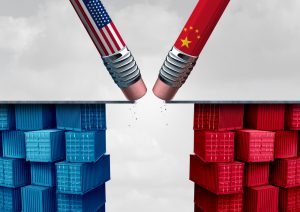
U.S. Rep. Jackie Walorski (R-IN) is spearheading a major congressional push that would allow American companies to request exclusions from the new China import tariffs.
Rep. Walorski, along with U.S. Rep. Ron Kind (D-WI) and a bipartisan coalition of 167 other members of Congress, this week requested that United States Trade Representative (USTR) Robert Lighthizer create a process whereby U.S. companies could request to be left off the list for recent tariffs imposed on $200 billion worth of Chinese goods as part of the federal government’s investigation into the communist country’s unfair trade practices.
“Such a process would afford U.S. companies the opportunity to seek relief if tariffs harm their global competitiveness and would help target the effects of the tariffs on China rather than on U.S. companies and their customers,” wrote Rep. Walorski and her colleagues in an Oct. 15 letter sent to the USTR.
The lawmakers acknowledged that China’s unfair trade practices in technology transfer, intellectual property and innovation warranted the three USTR Section 301 tariff lists of Chinese goods that will be taxed at higher rates by the United States government.
And they commended establishment of an exclusion process by the USTR for the first two lists.
“However, the lack of such a process for this most recent list is a glaring omission, particularly given its size in relation to the first two lists,” the congressmen wrote.
“We need to hold China accountable, but we need to do it in a way that doesn’t harm American manufacturers, farmers, workers, and consumers,” Rep. Walorski said earlier this week. “A fair and transparent exclusion process for U.S. businesses will help minimize the negative impact of these tariffs and build on our nation’s economic momentum.”
According to the letter, an exclusion process is critical to guarantee that U.S. companies could pursue Section 301 reprieves if their abilities to compete are hampered by a lack of alternative suppliers, for instance, among other special circumstances.
“The administration should heed our bipartisan call to establish a strong exclusion process and ensure we stay focused on the real target, which is China’s unfair trade practices,” said Rep. Walorski.
The lawmakers suggested to the USTR that the newly developed exclusion process be “fact-based, with criteria specified in the Federal Register for companies to meet to qualify for an exclusion,” which then would permit U.S. companies to determine if they meet such criteria and whether they should spend money on seeking an exclusion, the members wrote.
“The very least this administration can do is provide businesses the ability to petition their government to prove their case that these tariffs will hurt their businesses, workers and customers alike,” Rep. Kind said, adding that he “will continue to call on the president and Ambassador Lighthizer to end these reckless tariffs.”



